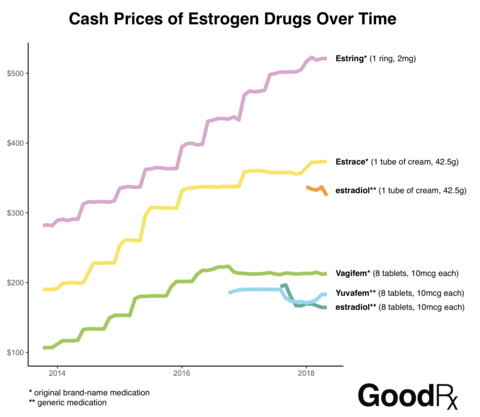
Women's hormone drug prices have climbed for years, but controversy hasn't ensued. Why?
Print
08 June 2018
Eric Sagonowsky / FiercePharma
Several drug pricing scandals have grabbed headlines in recent years in cases in which companies hiked the prices of old drugs or jacked up the cost of blockbuster drugs little by little year after year. Another case hasn't garnered the same attention—and maybe that's because people just don't like to talk about vaginas.
Branded versions of estradiol, a female sex hormone that treats vaginal atrophy related to menopause—a condition that can cause painful intercourse and other complications—have climbed in price for years, according to an analysis from drug pricing website GoodRx.
Estradiol comes in several forms, and prices for some of the drugs have climbed significantly. Allergan's Estrace Cream costs about $330 per tube, according to GoodRx, up from about $200 at the start of 2014. The price of Estring, a vaginal ring marketed by Pfizer, grew to more than $500 last month, from less than $300 at the start of 2014.
According to GoodRx, generics to Estrace carry a slight discount at about $280 per tube. No generics to Estring are available.

Estring is used for 90 days continuously, a Pfizer spokesperson said, and it's "covered by most insurance plans for the majority of patients." For eligible patients struggling to afford their medications, Pfizer has patient assistance programs or in some cases provides them for free. The company makes pricing decisions "based on a range of considerations, reflecting competitive and market dynamics as well as our continued investment to ensure the quality, safety and reliability of our medicines."
An Allergan spokesperson said that since 2016, Estrace Cream price hikes have fallen within the company's "social contract" pledge to limit price hikes to once per year at single-digit percentages. After the drug's patent loss in December 2017, generics have claimed 75% of the market, the spokesperson said. Estrace Cream generated $367 million in sales for Allergan last year.
Meanwhile, insurers have shifted more costs to patients through higher deductibles and copays, leaving patients with a higher share of the bill, and that means women are paying more out of pocket, according to The New York Times. To avoid that, some resort to buying the remedy from overseas outlets; one woman told the paper she orders her estradiol from overseas for about $80 for a three-month supply.
Adam Fein, CEO of Drug Channels Institute, told the publication some insurers have placed the drugs on high formulary tiers, so patients must pay more to get them.
But patients may be experiencing some cost relief—albeit minimal. Amneal launched a generic to Novo Nordisk's Vagifem in 2016 at a modest discount, and Teva launched another generic last July. With multiple generics vying for sales, prices could come down.
Estrace Cream lost its patent protections in December and faces new generic competition from companies including Mylan and Teva. The product is among a group of women's health drugs that Allergan recently put up for sale.
Estradiol's case is the latest example of growing drug prices to gain attention, but it comes after previous scandals such as Mylan's EpiPen and Turing Pharmaceuticals' Daraprim. Speaking with the Times, Lauren Streicher, M.D., medical director at Northwestern's Medicine Center for Sexual Medicine and Menopause, said the lack of attention to the drug so far is because of a taboo.
“Unlike EpiPen, women are not going to be rising up and saying, ‘My vagina is dry and I don’t want to pay $2,000 to $3,000 a year,’" she told the newspaper.
All Portfolio
MEDIA CENTER
-
The RMI group has completed sertain projects
The RMI Group has exited from the capital of portfolio companies:
Marinus Pharmaceuticals, Inc.,
Syndax Pharmaceuticals, Inc.,
Atea Pharmaceuticals, Inc.

